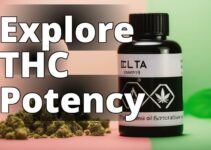What is Delta-8-THC?
– Delta-8-THC is a cannabinoid found in cannabis that has psychoactive effects but is less potent than Delta-9-THC.
– It is gaining popularity for its potential therapeutic benefits and milder psychoactive effects.
How is Delta-8-THC extracted?
– Delta-8-THC can be extracted from hemp or cannabis plants using various methods such as distillation or conversion from Delta-9-THC.
– The extraction process involves isolating and purifying Delta-8-THC to create a concentrated form.
Is Delta-8-THC legal?
– The legality of Delta-8-THC varies by country and state.
– In some places, it is legal if derived from hemp with less than 0.3% Delta-9-THC, while in others it is considered a controlled substance.
What Is Delta-8-THC?
Delta-8-THC (delta-8-tetrahydrocannabinol) is a minor compound naturally occurring in small amounts in marijuana plants. THC stands for tetrahydrocannabinol.
This compound is one of the primary ingredients responsible for the intoxicating effects of cannabis. However, it can also be synthesized from other chemicals present in cannabis.
Delta-9-THC (delta-9-tetrahydrocannabinol) is the primary compound in cannabis. The difference between delta-8-THC and delta-9-THC lies in the location of one of the double bonds in the chemical structure of the molecules.
Delta-8-THC has a double bond on the eighth carbon atom, while delta-9-THC has it on the ninth carbon atom. This subtle difference gives delta-8-THC slightly different properties from delta-9-THC.
Much like delta-9-THC, delta-8-THC produces psychoactive effects and binds to the receptors in the endocannabinoid system.
Concerns about the potential health benefits of delta-8-THC and its interaction with other cannabinoids are growing, and research is still ongoing.
How Delta-8-THC Works
The endocannabinoid system (ECS) plays a regulation role in several physiological processes. The endocannabinoid system is an intricate network of neurotransmitters, or cannabinoid receptors, throughout the body.
Cannabinoids such as delta-8-THC interacts with the cannabinoid receptors, altering how they work.
Delta-8-THC is a partial agonist of the CB1 receptors. It has a lower affinity than delta-9-THC, which may explain its reported milder effects. However, more research is needed to fully understand these differences.
Delta-8-THC also has a greater ability to suppress appetite than delta-9-THC.
Extraction of Delta-8-THC
Delta-8-THC is found in low concentrations in cannabis plants. It can be synthesized in the laboratory from CBD or delta-9-THC through a chemical reaction called isomerization.
Isomerization converts the molecular arrangement of a substance into a different but structurally identical substance, such as converting CBD to delta-8-THC.
The process of isomerization spontaneously occurs when delta-9-THC is exposed to air and light over time. This process can also be accelerated by heat and a catalyst.
The extraction process involves using various solvents, catalysts, and techniques to create high concentrations of delta-8-THC. Solvents may include ethanol, isohexane, or heptane.
Catalysts can include acids or bases like sulfuric acid, hydrochloric acid, or sodium hydroxide.
Smith, Kline & French first synthesized delta-8-THC in 1973 for the purpose of patenting the antiemetic effects of THC without the psychoactive effects.
Confusing matters further, some products marketed as distillate are reportedly only about 50% delta-8-THC.
The Legal Status of Delta-8-THC
The legal status of delta-8-THC is a complex and frequently evolving. Under the Controlled Substances Act of 1970, marijuana and delta-9-THC are classified as Schedule I substances, meaning they are illegal at the federal level.
However, this law does not explicitly address the legal status of delta-8-THC, as it is often synthesized from CBD, which was excluded from the definition of marijuana.
The 2018 Farm Billhemp was no longer classified as a Schedule I substance and legalized the production and sale of hemp-derived products, including those containing CBD.
Therefore, delta-8-THC derived from hemp is theoretically legal under federal law provided it contains no more than 0.3% delta-9-THC on a dry weight basis.
In all states, laws regarding delta-8-THC are currently being evaluated and changed.
Availability and Legitimacy
The primary source of delta-8-THC in the United States is hemp grown in America. The hemp plants and process of extracting delta-8-THC are regulated for quality, safety, hygiene, and reliability.
The recent rise in popularity and availability of delta-8-THC products has prompted concern among authorities.
The FDA is in the process of cracking down on these products, and many states have also implemented regulations or outright bans on delta-8-THC.
For consumers interested in trying it, it is essential to do thorough research on the product's legality and ensure that you are buying from a reputable source.
Medical Uses of Delta-8-THC
In general, the medical community has been focusing on the therapeutic possibilities of cannabinoid therapies.
There is limited research on medical use, and clinical trials on humans are lacking.
For instance, in a study conducted in 1995, certain properties of delta-8-THC were observed, such as a significant reduction in corneal pain. It is therapeutically relevant because delta-9-THC does not demonstrate this activity.
Other research has looked into its potential use as an antiemetic, appetite stimulant, anxiolytic, and neuroprotective agent.
Case Study: Jane's Experience with Delta-8-THC
Jane, a 35-year-old woman, had been suffering from chronic pain for several years due to a sports injury. She had tried various pain management techniques, but nothing seemed to provide long-lasting relief. Frustrated and desperate for a solution, Jane came across an article discussing the potential benefits of Delta-8-THC for pain management.
Intrigued by the positive testimonials she read, Jane decided to give Delta-8-THC a try. She obtained a Delta-8-THC tincture from a reputable source and started using it as directed. Within a few days, Jane noticed a significant reduction in her pain levels. She was able to go about her daily activities with less discomfort and felt a renewed sense of energy.
Not only did Delta-8-THC alleviate Jane's chronic pain, but it also helped improve her sleep quality. For years, Jane had struggled with insomnia, often waking up multiple times during the night. However, since incorporating Delta-8-THC into her routine, Jane experienced more restful sleep and woke up feeling refreshed and rejuvenated.
Jane's positive experience with Delta-8-THC highlights the potential benefits of this cannabinoid for managing chronic pain and improving sleep quality. While individual results may vary, Jane's story serves as an example of how Delta-8-THC can positively impact someone's quality of life when used responsibly and under the guidance of a healthcare professional.
Final Thoughts
Delta-8-THC is a compound found in marijuana that shares many similarities with delta-9 THC. It can also be synthetically made from other chemicals in cannabis.
Delta-8-THC can be synthesized in a lab, and the solvents, catalysts, and techniques used for extraction can affect the purity and safety of the final product.
Officially, according to the FDA, it is currently considered a controlled substance both synthetically and naturally derived.
In 2020, a new cannabis law was put in place, distinguishing delvopentyl from its more well-known counterpart, delta-9-THC.
Many states have already permitted the legal sale of delta-8-THC products as CBD supplements with a limit of about 0.4%. They can be helpful in addressing various health issues, but always be sure to pursue this with medical guidance.
When considering using delta-8-THC, keep a close watch on the latest FDA and state guidelines for any changes that could impact your use.
Questions & Answers
Q. What is delta 8 THC?
A. Delta 8 THC is a cannabinoid found in cannabis that has psychoactive effects.
Q. Who can use delta 8 THC?
A. Delta 8 THC can be used by adults who are of legal age to consume cannabis products.
Q. What are the effects of delta 8 THC?
A. Delta 8 THC produces a milder high compared to delta 9 THC, with a calming and uplifting effect.
Q. How is delta 8 THC consumed?
A. Delta 8 THC can be consumed through various methods, including vaping, edibles, and tinctures.
Q. What are the potential benefits of delta 8 THC?
A. Delta 8 THC may provide pain relief, reduce anxiety, and stimulate appetite.
Q. Isn't delta 8 THC illegal?
A. Delta 8 THC legality varies by jurisdiction, but it is federally legal in the United States if derived from hemp.
Samuel Bennett, M.D., is a renowned medical professional with over 20 years of experience in the field of cannabis research. As a board-certified physician and a leading expert in cannabinoid medicine, Samuel Bennett has dedicated their career to studying the therapeutic potential of various cannabis compounds.
Samuel Bennett obtained their medical degree from a prestigious university and completed their residency training in Internal Medicine. They later pursued a fellowship in Integrative Medicine, focusing on alternative therapies and natural remedies. Throughout their career, Samuel Bennett has published numerous peer-reviewed articles on the medical applications of cannabinoids, including delta-8-THC.
In addition to their academic achievements, Samuel Bennett has also served as a consultant for pharmaceutical companies and regulatory agencies, providing expert guidance on cannabis-based medications. Their extensive knowledge and experience have made them a sought-after speaker at international conferences and symposiums.
With a passion for educating the public on the potential benefits and risks of cannabis use, Samuel Bennett strives to provide evidence-based information to help individuals make informed decisions about their health.




